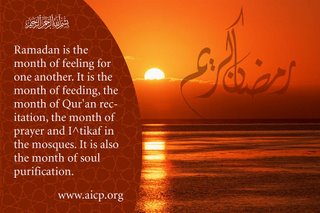 This is a recipe for a soup that is supposed to have been a favorite of the Prophet’s (peace be upon him). There is apparently a hadith in which he says that Aisha held the same place among his wives that tharid held among food—anyway, it sounds tasty and we’re having it for iftaar tonight, and I share it in case it sounds good and in the spirit of Ramadan to anyone else.
This is a recipe for a soup that is supposed to have been a favorite of the Prophet’s (peace be upon him). There is apparently a hadith in which he says that Aisha held the same place among his wives that tharid held among food—anyway, it sounds tasty and we’re having it for iftaar tonight, and I share it in case it sounds good and in the spirit of Ramadan to anyone else.In a large pot, put ¼ c. cooked chickpeas, 5 stalks parsley and 1 stalk celery, a 3 ½ lb. chicken, salt and pepper, 2 Tbsp. ghee or clarified butter, and 2 ½ quarts water. Bring to a gentle boil, then simmer for an hour or until the chicken is no longer pink.
Discard the herb and celery. Remove the chicken, and take the meat off the bones when it’s cool. Sprinkle the chicken with 2 ½ tsp. baharat (a spice mixture, recipe below) and salt to taste.
Beat 2 eggs in a bowl with ½ Tbsp lemon juice. Whisk a few spoonfuls of the hot soup stock into the eggs, then transfer the mixture back into the soup, whisking rapidly so the eggs don’t curdle from the heat. Keep the soup over very very low heat.
In a large skillet, heat ¼ c. olive oil and brown the chicken meat with 1 ½ Tbsp lemon juice (the total lemon juice in the recipe should equal that of one lemon) over medium-high heat. Remove the browned meat to a platter, add ¼ c more olive oil to the pan, and cook slices of dry/day-old bread (about ½ baguette) until lightly golden.
To serve, place bread in the bottom of each bowl, ladle the soup on top, and serve the chicken on the side or in the soup.
To make baharat, mix together 1 tsp ground cinnamon, 1 tsp dried rose petals, and 1 tsp finely ground black pepper. I substituted ground allspice and a little freshly ground nutmeg for the rose petals. This recipe comes from Clifford Wright’s wonderful book, “A Mediterranean Feast”.
I’d like to add as a question—What are people reading during Ramadan, apart from the Qu’ran?

9 comments:
Hannah thank you for sharing this recipee. I hope to gather the motivation and actually cook it myself!
Rijju, it sounds yummmy doesn't it? Why don't you make it for your family? I'm sure they would love the surprise. :)
Off-topic Question …
Why do they always have this lantern as one of the symbol of Ramadan? Malls; streets; posters, cards etc … you can almost find it everywhere
Okay, the crescent moon represents the beginning of the Ramadan
And the dates represent the Sunnah i.e. to open the fast with it
But then what does a lantern represent?
As salamu aleykum!
Well Hannah, besides the Quran, you could also read Ahadith, the traditions and sayings of the prophet Muhammad (pbuh), or you could read the stories of all our prophets, learn new du'as, you could read a lot of stuff...it's all ibadah!
Good luck!
By the way, anyone that DOESN'T fall behind with the Quran reciting?????
I usually read anything in times when I'm religiously motivated. Hadith, Islamic history, books on religious dialogue whatever I can get my hands on.
Assalaamu alaikum,
that Ramdan lantern (fanoos) is an old Egyptian tradition.
Sorry.. that's Ramadan, of course...
Creation, welcome, and Ann, welcome to you too :)
I am assuming you are referring to teh lantern in the banner of the webpage?
I made that banner using pictures I took from Bosnia on my latest trip. The lantern was part of an old Bosnian house from the Ottoman period.
Lanterns associate to light, which somehow associates to spirituality. That is why I used it :)
Assalaamu alaikum,
Thanks for the welcome. I think this blog is a nice idea, masha'allah. About the lantern, I was actually responding to creation's question: "Why do they always have this lantern as one of the symbol of Ramadan?"
Hmm... maybe you're right
Post a Comment